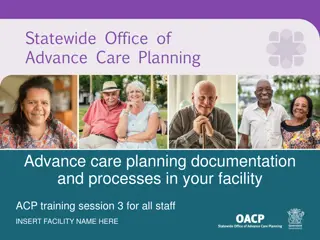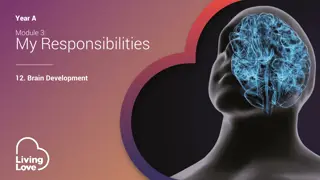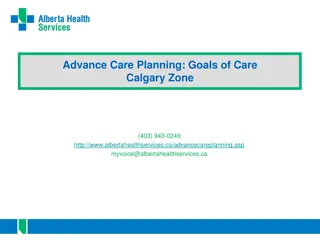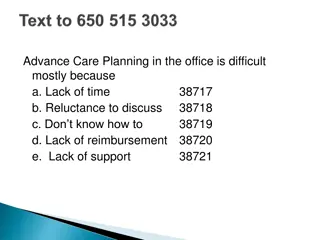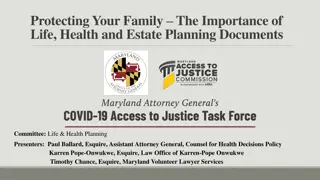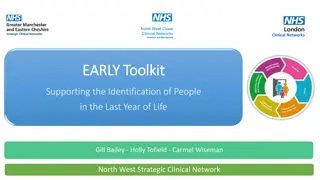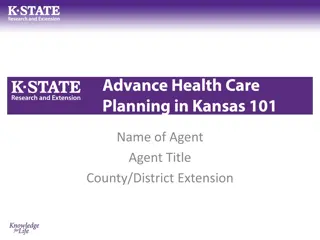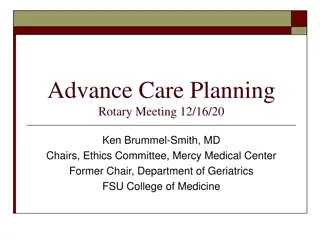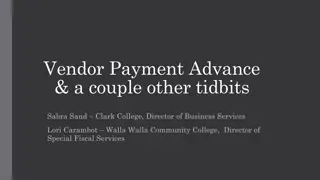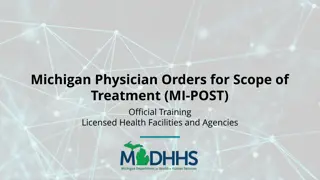Advance Care Planning - Anticipating Future Decision-Making
Advance care planning involves pre-emptive discussions anticipating future inability to make decisions. It aims to guide future treatment decisions aligning with one's goals, preferences, and values. Components include advance directives, substitute decision makers, and support persons.
Download Presentation

Please find below an Image/Link to download the presentation.
The content on the website is provided AS IS for your information and personal use only. It may not be sold, licensed, or shared on other websites without obtaining consent from the author.If you encounter any issues during the download, it is possible that the publisher has removed the file from their server.
You are allowed to download the files provided on this website for personal or commercial use, subject to the condition that they are used lawfully. All files are the property of their respective owners.
The content on the website is provided AS IS for your information and personal use only. It may not be sold, licensed, or shared on other websites without obtaining consent from the author.
E N D
Presentation Transcript
Estate Planning Claudine Siou, Senior Technical Services Manager 20 July 2020
Disclaimer This presentation contains general advice only and does not take into account your financial circumstances, needs and objectives. Before making any decision based on this information, you should assess your own circumstances or seek advice from a financial adviser. You should obtain and consider a copy of the relevant Product Disclosure Statement (PDS) or offer document available from us or your financial adviser, before you acquire a financial product. The content of this presentation is not intended to represent or be a substitute for specific taxation or legal advice and should not be relied on as such. If you intend to rely on any of the information in this website to satisfy liabilities or obligations or claim entitlements that arise, or could arise, under a taxation or other law, you should obtain advice from a registered tax agent or lawyer. Any taxation, legal and other matters referred to in this presentation are based on IOOF's interpretation of existing laws and should not be relied upon in place of appropriate professional advice. Those laws may change from time to time. While the IOOF group has taken all reasonable care in producing the information on this website, the IOOF group makes no representations in respect of, and, to the extent permitted by law, excludes all warranties in relation to, the accuracy or completeness of the information. The IOOF group, its officers, employees, directors and contractors exclude all liability whatsoever for any loss or damage, howsoever arising out of reliance, in whole or in part, on the information. 2
Agenda Estate planning for elderly clients Advance care planning Enduring Power of Attorney (EPOA) Super beneficiary nominations Effect of divorce or separation on: Will Intestacy Super beneficiary nomination Family provision 3
Advance care planning What is advance care planning? Advance care planning is having pre-emptive discussions and planning that anticipates a future loss of ability to make or communicate decisions. Reflects principles of autonomy, self-determination and dignity What is the objective of advance care planning? To guide future decision-making about a person s treatment and care so that it is consistent with their goals, preferences and values. The process helps health professionals and a person s family and friends know what kind of treatment and care the person would want in the future. Source: Advance care planning in Australia background paper 5 June 2019 (Royal Commission into Aged Care Quality and Safety) 4
Components of advance care plan Advance care plans are relied on only if a person loses their ability to make or express their own decisions Advance care directive An advance directive is a formal document that records a person s directions for their future care and treatment. Substitute decision makers In all states and territories, a person can appoint someone to make decisions on their behalf in the event they become unable to make their own decisions. Support persons In Vic, a person can appoint a support person to assist the person to make, communicate and give effect to medical treatment decisions. Useful resource for all states/territories: www.advancecareplanning.org.au 5
Advance care planning Advance directive Substitute decision-maker: medical Substitute decision- maker: lifestyle and personal Substitute decision- maker: financial Advance Care Directive Enduring power of guardianship Enduring power of attorney NSW Advance Care Directive Medical Treatment Decision-maker Enduring power of attorney VIC Advance Heath Directive Enduring power of attorney QLD Advance Health Directive Enduring power of guardianship Enduring power of attorney WA Advance Care Directive Enduring power of attorney SA Advance Care Directive Enduring power of guardianship Enduring power of attorney TAS Health Direction Enduring power of attorney ACT Check with facility to determine if facility is retirement village or lifestyle village Check with facility to determine if facility is retirement village or lifestyle village Advance Personal Plan NT 6
Enduring power of attorney (EPOA) What is an enduring power of attorney? Legal document by which principal grants the attorney (or attorneys), the power to make financial and legal decisions, on behalf of the principal. Continues to have effect if principal loses capacity to manage their own affairs. Important considerations: Trusted individual(s) Commencement of powers can be specified Scope of powers can be limited or broad Having an EPOA can avoid need for tribunal appointed substitute decision-maker 7
Common misconception with EPOA Truth: EPOA continues to have effect after loss of capacity Misconception: EPOA commences only on loss of capacity 8
EPOA - when to exercise vigilance Conflicts of interests EPOA focuses on needs of attorney or loved ones Focus on interests of client (disregard interests of all others) Real life examples We want to invest the money in growth, its our inheritance anyway. I want to invest my mother s money in an investment bond and nominate myself as the beneficiary. This is my mother s wish. My husband opened a new super account and did not make a binding nomination. Now he has lost capacity. I want to nominate myself as I want to receive a death benefit pension. Can I place my mother s money in my mortgage offset account, as it will earn a better rate of return than in a term deposit? 9
EPOA - when to exercise vigilance Doubts about loss of capacity Client might have capacity to make some decisions but not others When in doubt about client s loss of capacity medical assessment, EPOA can apply to tribunal Real life examples I m not sure if my mother has lost capacity to make her own decisions. My client has been diagnosed with early onset Alzheimer s disease. She appears to be losing capacity because she forgot about one of her term deposits. How do I invoke the EPOA? My wife is eligible for aged care due to mental health issues. She thinks she has capacity to make her own decisions, but I don t. 10
EPOA - when to exercise vigilance Acting within the scope of powers? Gifts, conflict transactions, binding nomination, validity Check if EPOA document expressly grants authority if in doubt, EPOA can seek legal advice or apply to tribunal Real life examples Can we receive a gift from our dad now, so we can contribute the money to super? We are the two beneficiaries of our dad s estate. Can I be paid for looking after my mother? I m the only child and beneficiary of her will. Can an EPOA make a binding nomination? I am the EPOA for my husband. Can I still use the EPOA after his death? 11
Elderly clients super beneficiary nominations Nomination Description How does subsequent loss of capacity affect? Binding nomination Governing rules permit Notice in accordance with SIS Regulations Expires 3 years after first signed or last confirmed or amended Governing rules permit Requires the consent of the trustee Trustee discretion If member loses capacity, can EPOA: Make new? Confirm existing? Vary? Revoke? Non-lapsing nomination No effect Non-binding nomination No effect Reversionary nomination Governing rules permit Applies to income streams No effect 12
EPOA and binding nominations Qld Narumon case - facts Member of SMSF, Mr Giles, passed away age 80 Wife and 16yo son 4 adult children from previous marriage Estate $200K Super benefits $1M accumulation account and $3M value of lifetime complying pension Family provision application Member made 5 BDBNs between 2010 and 2013 beneficiaries wife, son and sister in various proportions. Joint EPOAs: wife and sister EPOA document did not specify terms of power eg authority to enter conflict transactions EPOAs made 2 BDBNs on date BDBN expired extension (confirmed member s wishes) and new (changed proportions to exclude sister who was not a SIS dependant) 13
EPOA and binding nominations Qld Narumon case Issue: Can joint EPOAs make a BDBN after member lost capacity which Confirms member s BDBN? Varies member s BDBN? Court looked at whether restrictions in: SMSF trust deed - No Super legislation - No Qld POA legislation conflict transaction? 14
EPOA and binding nominations Qld Narumon case Court considered: General law EPOA restricted by general law from doing personal acts (principles reflected in legislation) eg making or revoking a will Making a BDBN is not a testamentary act, so EPOA is not restricted from making a BDBN Qld POA legislation Qld & Vic similar financial matter , conflict transaction provisions of POA legislation Is the execution of a BDBN a financial matter ? Matter relating to the principal s financial or property matters (inclusive list of examples) Yes 15
EPOA and binding nominations Qld Narumon case Qld POA legislation permits EPOA to enter conflict transaction ONLY IF: Principal authorises transaction (or of that type or generally) Mr Giles did not give authority Conflict transaction transaction in which there may be a conflict or results in conflict between duty of attorney towards principal and interests of attorney (or relative, business associate or friend) or another duty of attorney EPOA argued interests of principal and attorney coincide rather than conflict 16
EPOA and binding nominations Qld Narumon case Court s decision: EPOA can confirm BDBN. NOT a conflict transaction. Fact that Mr Giles did not authorise conflict transactions did not matter Variation of BDBN was a conflict transaction, not authorised by Mr Giles. Variations different considerations arise: Actual or potential conflicts of interest Scope of authority (authority to enter conflict transactions) Whether act was one on behalf of and in the interests of principal BDBN executed in circumstances that was a conflict transaction could be declared invalid. If in doubt, EPOA can prospectively approach the court for directions. 17
EPOA & BDBNs The ALRC considers that BDBNs should be seen to be will-like in nature, and, from a policy perspective, treated similarly to wills. There is much uncertainty and ambiguity concerning BDBNs of superannuation funds, particularly whether an enduring attorney may sign a BDBN on behalf of a member. The ALRC has therefore concluded that these uncertainties and ambiguities need to be resolved in a focused review of the provisions to establish the clear ambit of the legislative provisions and their relationship to superannuation trust deeds. The ALRC report articulates a policy position that an attorney under an enduring power, by virtue of that power alone, should not be able to make a binding death benefit nomination for a member of a superannuation fund. The report acknowledges the distinction between making such a nomination, as opposed to renewing or confirming a nomination previously made by the member, thus continuing the autonomous choice of the member . Source: Narumon Pty Ltd [2018] QSC 185 18
EPOA & BDBNs Check with super fund Does the super trust deed permit an EPOA to make (confirm, renew) a BDBN? Check EPOA document Is there an express power given in EPOA document to make a BDBN? Tasmania in addition to expressly authorised powers, but subject to any conditions or restrictions, attorney may exercise any power of donor in respect of any superannuation of the donor Is there an express power given in EPOA document to enter into a conflict transaction? Confirm or renew? Generally cannot make new BDBN where one doesn t exist Generally cannot vary or revoke BDBN If in doubt, suggest EPOA seek legal advice or advice from state/territory tribunal 19
Divorced or separated clients - wills Effect of divorce on will differs depending on state or territory law Revoke dispositions to or appointments of, former spouse Effect of separation on will (if still married) none Separated for at least 12 months before divorce Consider implications if client dies before divorce Make a new will? Jointly held assets may be unilaterally converted to tenants in common 20
Effect of divorce on will Dispositions to former spouse Revokes Power of appointment Appointment as executor, trustee, guardian Revokes except, if former spouse is trustee of property held for beneficiaries that include children of spouse Revokes if exercisable by or in favour of former spouse, but not if exercisable exclusively in favour of children of marriage Revokes except power of appointment exercisable in favour of children of marriage Revokes if exercisable by or in favour of former spouse but not if exercisable only in favour of children of marriage NSW Revokes Revokes except, if former spouse is trustee of property held for beneficiaries that include children of the spouse Revokes except, if former spouse is trustee of property held for beneficiaries that include children of former spouse VIC Revokes QLD Revokes will, except if contrary intention in will or other evidence of such intention Revokes if exercisable by or in favour of former spouse or former partner of registered relationship, except if testator is bound to grant power under a contract WA SA Revokes disposition to former spouse or former partner of registered relationship, except if testator bound to dispose to that person under a contract Revokes 21
Effect of divorce on will Dispositions to former spouse Power of appointment Appointment as executor, trustee, guardian Revokes disposition to former spouse or former partner of registered relationship Revokes if exercisable by or in favour of former spouse or former partner of registered relationship, except if exercisable exclusively in favour of children of marriage (or registered relationship) Revokes power of appointment given to former spouse, civil union partner or civil partner Revokes, except if former spouse (or former partner) is trustee of property held on trust for beneficiaries that include children of former spouse (or former partner) TAS Revokes disposition to former spouse, civil union partner or civil partner Revokes Omits appointment of former spouse, civil union partner or civil partner as executor, trustee or guardian ACT Revokes power of appointment exercisable by or in favour of former spouse, except if exclusively in favour of children of marriage Revokes, except if former spouse is trustee of property left on trust for beneficiaries that include children of former spouse NT 22
Married but separated clients intestacy What is intestacy? Die without a will Die with a will that does not effectively dispose of all or part of property (partial intestacy) Rules differ according to state or territory Married but separated Unintended outcomes on intestacy Intestacy rules recognise multiple spouses Married but separated spouse receives all or part of the estate on intestacy 23
Married but separated intestacy Married but separated 1. Effect on divorce on family provision If no children or all children of deceased are children of married spouse: entitled to whole estate If all children of deceased are not children of married spouse: entitled to personal effects, statutory legacy (approx. $487,000), 1/2 remaining estate If no children or all children of deceased are children of married spouse: entitled to whole estate If all children of deceased are not children of married spouse: If estate < statutory legacy ($471,240), married spouse is entitled to whole of estate If estate > statutory legacy, married spouse is entitled to personal effects, statutory legacy and 1/2 remaining estate NSW VIC If no children, married spouse is entitled to whole estate. If children, married spouse is entitled to: $150,000 and household chattels 1/2 remaining estate, if only 1 child (or surviving child of deceased child); otherwise 1/3 remaining estate QLD If children and estate (excl. household chattels) < $50,000, married spouse entitled to whole estate estate (excl. household chattels) > $50,000, married spouse entitled to $50,000 and 1/3 remaining estate If no children but parent, brother, sister (or child of brother/sister) and estate (excl. household chattels) < $75,000, married spouse is entitled to whole estate estate (excl. household chattels) > $75,000,married spouse is entitled to $75,000 and 1/2 remaining estate WA 24
Married but separated intestacy 1. Effect on divorce on family provision Married but separated If no children, married spouse is entitled to whole estate If children, married spouse is entitled to $100,000 and 1/2 remaining estate If no children or all children of deceased are children of married spouse: entitled to whole estate If all children are not children of married spouse: entitled to personal effects, statutory legacy (approx. $433,000) and 1/2 remaining estate If no children, married spouse is entitled to whole estate If children and estate < $200,000, married spouse entitled to whole estate If children and estate > $200,000, married spouse entitled to $200,000 and 1/2 remaining estate if 1 child (or surviving child of deceased child); otherwise 1/3 remaining estate If no children and no parent, brother, sister (or child of brother/sister), married spouse is entitled to whole estate If children and estate > $350,000, married spouse is entitled to $350,000 and 1/2 remaining estate if 1 child (or surviving child of deceased child); otherwise 1/3 remaining estate If no surviving children but parent, brother, sister (or child of brother/sister) and estate < $500,000, married spouse entitled to whole estate estate > $500,000, married spouse is entitled to prescribed amount and 1/2 remaining estate SA TAS ACT NT 25
Married but separated clients Should consider making a will because: Separation has no effect on provisions in an existing will If there is no will and the client dies before divorce, the married spouse may receive the entire estate or a substantial part of the estate 26
Divorced or separated clients super Effect of divorce or separation on super beneficiary nominations If married but separated, spouse is SIS dependant Former spouse (previously married, de facto or registered relationship) is generally not a SIS dependant However could be a financial dependant or in an interdependency relationship Binding, non-lapsing, reversionary nomination invalid? Tax dependant Former spouse (previously married, de facto or registered relationship) Financial dependant Update super beneficiary nominations Interdependency relationship 27
Divorced or separated clients family provision What is family provision law? Family provision law recognises that, although people are free to give away their property by will after they die, or to not make a will at all, they also have a responsibility to provide for certain people, usually family members. Differs depending on state or territory Divorced clients Former spouse may be an eligible person Separated clients If married, spouse is eligible person If not married, former spouse may be an eligible person Family provision claim by eligible person, if there is a will or intestacy 28
Spouse is eligible person When former spouse is eligible person Divorce or separation family provision Married spouse, de facto spouse Former wife or husband must establish that there are circumstances that justify regarding former spouse as natural object of testamentary recognition NSW 1. Effect on divorce on family provision Married spouse, de facto or registered relationship Former spouse or former domestic partner if they would have been able to take family law proceedings and has not taken or has commenced but not finalised (and can t be finalised after death) VIC Married spouse, de facto spouse, civil partner Married spouse, de facto spouse Dependant (includes parent of child under 18 of deceased) QLD Former spouse who is entitled to spousal maintenance under court order or agreement WA Married spouse, domestic partner Divorced from deceased SA Married spouse or civil relationship Divorced from deceased or was in a significant relationship with deceased which ceased before death and is entitled to maintenance under a court order or agreement TAS Domestic partner (at any time) and was married spouse (at any time) civil partner (at any time) domestic partner for at least 2 years (at any time) parent of child of deceased ACT Married spouse or de facto spouse Former spouse or former de facto spouse, only if maintained by deceased at date of death NT 29
Key messages Be familiar with the formal advance care planning mechanisms in your state or territory An EPOA may be able to confirm or renew an existing BDBN however different considerations apply if the EPOA makes a new or varies a BDBN Be vigilant when dealing with an EPOA who considers their own interests (or the interests of others) who gifts, confers benefits or enters into conflict transactions if the client s lack of capacity is in question Separated clients should have a will and update super beneficiary nominations 30


